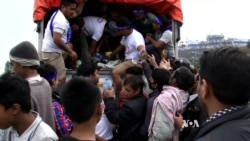The United Nations and numerous non-governmental organizations seeking to assist quake-stricken Nepal are blaming the country’s weak government, with a reputation for inefficiency and corruption, for hindering the massive relief effort.
VOA News has compiled from various organizations complaints from across Nepal of bottlenecks at customs, repeated harassing inspections of aid convoys and seizure of goods by local officials intent on distributing them along sectarian lines.
“If the Nepal government had any brains what they would do is call together all the outsiders who’ve come to help and the local NGO’s and delegate to them,” said a prominent actor, Shiva Shrestha, who is helping with aid efforts. “If the government tries to do it on its own it’s going to be too late.”
At Tribhuvan International Airport relief materials are piling up due to a customs backlog. The country, since the earthquake, has lifted import taxes on tarpaulins and tents, but not on other items critically needed for millions of hungry and homeless survivors of the April 25 earthquake.
U.N. officials are calling for that to change.
"They should not be using peacetime customs methodology," the U.N.’s resident representative in Nepal, Jamie McGoldrick, told Reuters news agency.
Even for local organizations the effort required to get supplies donated from overseas has proven to be Kafkaesque, requiring multiple trips among several ministries to get signatures for clearances of imports.
A leading Nepalese social activist and founder of the Maiti Nepal NGO, Anuradha Koirala, “screamed at everybody” in frustration, trying to get approval from three Nepal government ministries for medicine and mats sent by a donor in Hong Kong. “We are in distress. We want our things to come easily.”
She is incredulous that the relevant government agencies are not working around the clock and have not gathered approving personnel in one place to help expedite the frustrating process.
Koirala, whose organization cares for orphaned children and abused women, ended up appealing directly to the prime minister’s advisor, as well as Chief Secretary Leela Mani Poudyal.
Amid reports of aid convoys being delayed for repeated inspections by uniformed officials or being looted, Koirala on Saturday dispatched seven trucks to Gorkha and had them protected by local people lining the roadsides.
VOA News confirmed with several international and Nepalese NGO's reports of aid shipments inside the land-locked country in the Himalayan foothills being repeatedly delayed or seized by local authorities but none wanted to go on the record, fearing worse ramifications for the work at a critical time.
Mercy Corps spokesperson Christine Bragale said she was not aware of any of her organization's aid being intercepted but acknowledged a "very challenging response and a lot of logistical hurdles" because "we all need to order mass quantities."
"We've not encountered any issues," said Davinder Kumar, global media manger for Plan International, noting his organization has operated in Nepal since 1978 and thus "we enjoy very, very good relations with the communities we're in."
That there are those “who want to take undue advantage at a time of crisis,” according to Kunda Dixit, publisher-editor of the weekly Nepali Times, should come as no surprise in a country that is still recovering from a decade-long civil war between Maoists and the government and a subsequent fractured political system so paralyzed that a new constitution has yet to be implemented.
“Extortion, blockages of roads, and corruption, was the order of the day for the last, at least, eight years after the conflict and during the conflict,” explained Dixit.
Apolitical Nepalese want feuding ministers to put aside political differences for the sake of the nation.
“If the government doesn’t do it, the government will face consequences,” warned Shrestha, the veteran action and romance screen idol.
Malvika Subba, a former Miss Nepal (2002), the lead volunteer for a local NGO, Nepal Share, agrees.
“When they’re levying rules and regulations to us, NGOs and to all the organizations, to be transparent about things they themselves need to be transparent and accountable. So they better do that.”
One of the government edicts prompting widespread condemnation concerns donations.
Any money collected by NGOs established after the earthquake must be handed over to the Prime Minister’s Fund, which is to handle distribution.
“First of all it’s unenforceable. Secondly it turns even innocent people into criminals unnecessarily. And it’s not even necessary because this is a period in our country’s history with this crisis and emergency where we want all the help we can get,” said newspaper publisher Dixit. “So why would you want to shoot yourself in the foot? So I think there are some pretty stupid people making some very stupid decisions in government."
Koirala, the director of Maiti Nepal, says those able to offer assistance to dispense need to “go into the field,” detouring government roadblocks.
When a group of young foreigners showed up at her NGO’s Kathmandu headquarters on Saturday she told them precisely that.
The government has “to give permission to everybody, not only (operate) a one-window policy,” Koirala asserts. “We don’t trust that if we hand over to the government it will reach the people who are suffering.”
The international community has pledged more than $60 million in emergency aid in response to the magnitude 7.8 earthquake which killed thousands of people.
The United Nations says an additional $350 million is needed at a time when several million people require food assistance.
The total cost for Nepal’s reconstruction is expected to total $5 billion.
“There’s going to be graft,” predicts Dixit. “This is an extremely corrupt country. The corruption was really becoming an epidemic here, even before this crisis.”
Dixit and others put their faith in civil society and the media “who will put their antennas up” to try to ensure much-needed accountability as those billions of dollars begin to permeate Nepal’s soil, which has already literally undergone a tectonic shift.






